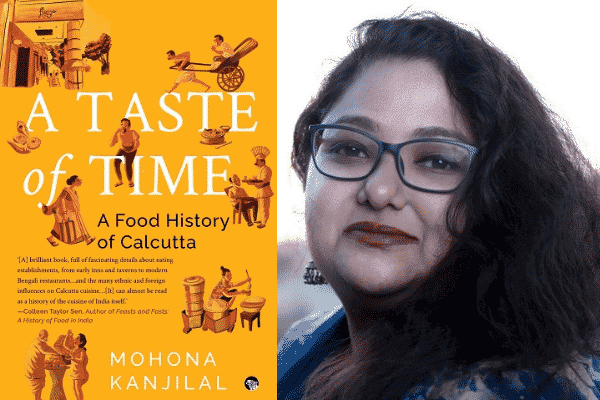Mohona Kanjilal’s latest book, A Taste of Time: A Food History of Calcutta (Speaking Tiger), is a love letter to a city.
Even as she explores cuisines and eateries synonymous with Kolkata, the author discovers her city anew with every page – first with surprise, and then gratitude.
The book is a journey through the ever-changing landscape of Kolkata’s food and cultural milieu, from its decades’ old cutlet, jhal muri and puchka stalls to its iconic continental restaurants like Firpo’s and Flurys, and from its oldest tea shop Favourite Cabin to the 21st-century fine dining restaurants. And so the book becomes a book not only about the food of Kolkata but also its history, sights, sounds, colour and smell.
Kolkata is a city that grows on you, Kanjilal noted. “This holds true even for the non-Bengalis – there is something special about this city and its people – be it the warmth that the inhabitants of this city exude or their tolerant nature – really difficult to point out a single factor. Kolkatans are not only culturally active but politically aware and intellectually alert. Every interesting nugget of information I would discover while researching on the city would get me excited and make my city all the more endearing to me.”
Kanjilal, who has written two short story collections before, says the idea for the book came when she stopped by at Nahoum’s, the Jewish bakery, one day. The old-world charm in its decor and a nostalgic feeling of a bygone era, caught her eye. “When they told me that the place was established in 1902, it got me thinking about other old eateries in Kolkata.”
While interacting with the owners of these eateries for her research, Kanjilal also came across interesting nuggets of information about Kolkata’s food history, which she began exploring in detail. “I realised that this cosmopolitan food culture in Kolkata developed when it became an important centre of trade and commerce and was made the royal capital, attracting many communities to it. Now my research, which had begun with a vague idea, became more defined. So, the book is a combination of history and food.”
Of the numerous places – Armenian, Jewish, Chinese, Parsi and Indian ones she explored, the one where she loved spending time was Favourite Cabin on Surya Sen Street, the first tea shop to come up in the city. “There is so much history entwined with this place. It was a popular hub for freedom fighters. They would visit the shop in disguise and discuss politics over garom cha. Whenever the police conducted raids on the shop, the owner would signal to them in code, and they would escape, right on time, from the back door. Not a single freedom fighter was ever caught there.”
Mention the misconception among people living outside Bengal that the food from here is all about maachh and mishti (fish and sweets), and she smiles. “There’s a plethora of vegetarian dishes in Bengali cuisine. I can think of at least ten different types of dishes that can be made with a single vegetable, like bottle gourd in our cuisine, right from savoury to sweet dishes.”
She adds that today, Kolkata has a flourishing hospitality industry. Local food entrepreneurs picked up the threads from the Europeans and began setting up restaurants. “Park Street and Dacres Lane are the two food streets of Kolkata. While the former has its fair share of upscale restaurants, the latter is the mecca of street food. There are different categories of restaurants to suit all kinds of budgets. And the number of such places seems to be growing because there is an increasing demand for them. Kolkatans love to celebrate life and one of the ways they do it is through food.”
Stressing that the book provided her an opportunity to see the city afresh, Mohona noted, “I was a Kolkata addict before. But this book has turned me into a hardcore one.”
IANS
READ ALSO: Book Review: ‘Death in Colaba Bay’ by Ambika Subramanian
Link up with us!
Indian Link News website: Save our website as a bookmark
Indian Link E-Newsletter: Subscribe to our weekly e-newsletter
Indian Link Newspaper: Click here to read our e-paper
Indian Link app: Download our app from Apple’s App Store or Google Play and subscribe to the alerts
Facebook: facebook.com/IndianLinkAustralia
Twitter: @indian_link
Instagram: @indianlink
LinkedIn: linkedin.com/IndianLinkMediaGroup



